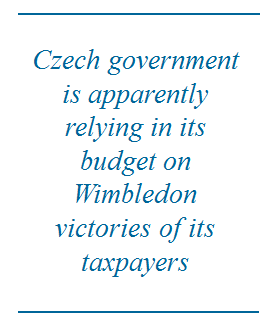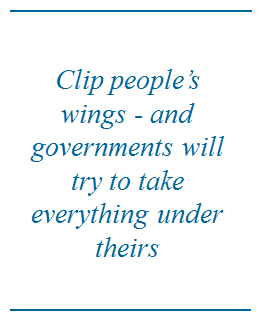Carrying keys on your person is dangerous if you are a Wimbledon champion, tax authorities will charge you heavily for such audacity. At least one EU government’s budget apparently relies on its citizens winning the Wimbledon. And it encourages envy. If successful sports-people representing their countries want to help their fellow citizens, they should stop being patriotic.
No key is key
So you’ve won Wimbledon. Well done! Now quickly, before you forget, make sure that you do not carry a home key with you. It could cost you many millions of Euros. It does not matter how you arrange entry to your dwelling after you return home from the All England Lawn Tennis and Croquet Club. You can ask your trainer to carry the key for you, that’s OK. You can keep the key under a flowerpot in your front garden, if you dare. You can probably also (though this has not been tested in the courts yet) just have a digital pin-code entry: it uses a mental rather than physical key and no lawyer can probably prove that you actually carry the pin-code in your head. Just do not have the means of entry on your person. Why?
Wimbledon winners have tried to get away with carrying a key, and failed. Consider the 1985 Wimbledon Champion: Boris Becker (who also won in 1986 and 1989). At the height of his career, he spent virtually all his days on the road, going from tournament to tournament. There is no way that he could get anywhere close to spending in his native Germany a half of his days in a year, the usual threshold in most states for considering someone a tax-resident. That, however, did not prevent the tax authorities of investigating where Becker actually lived. He had once let slip in an interview with a German newspaper that he lived in Munich. It is true that he occasionally slept in a house belonging to his sister when he was in Munich, but Becker maintained that he only used it when visiting Germany in his busy schedule, his actual home was in Monaco. No matter. The ultimate clincher for the tax authorities was the finding that – yes, he actually had the key to the property, and therefore presumably could “enter it at any time”. In the end it cost him millions of dollars in taxes and two years’ probation.
The question whether Wimbledon champions living in Monaco can legally carry keys to other properties without vindictive tax consequences has become topical again this week. The ladies’ winner Petra Kvitová, also a resident of Monaco has been making headlines in the country of her birth (the Czech Republic). On the first day, it was for winning Wimbledon. On the second, the main topic was how much she personally gained in prize money. On the third day after Wimbledon the media’s main topic were the “fiscal consequences of Petra’s Wimbledon”, i.e. how much she will alleviate the Czech government’s chronic deficits. Then someone broke the news that Petra had changed her domicile to Monaco last year, and all hell broke loose.
Pay your taxes legally and you’re still dirt
A Member of Parliament for the governing socialist party (and former member of the Communist Party and the communist police) posted an inflammatory and offensive note on the internet, calling her “a piece of dirt”. Ever since, for over a week, the nation has been divided on the issue whether people should have the right (sic) to change their domicile without forfeiting their citizenship.

Economists were also called upon to voice their opinion. From one professor at Charles University (the most revered site of learning in the country) came an interesting revelation that the Czech government is apparently relying on Wimbledon victories of its taxpayers when setting up the year’s budget, as he opined that the money “will now be missing [sic!] in the budget” and that the country “could have used the money in public accounts”.
Having an opinion on the Kvitová question is now compulsory. Rational debate is very scarce, most arguments relate to ill-defined notions of “propriety” and “debt to the nation which created (sic!) her success”. In an ultimate irony, she is accused for being “unpatriotic” – when in fact she creates waves of patriotism whenever she plays and ranks high.
Do tax exiles really pay no tax?
The view that making your domicile elsewhere will starve your government’s budget is, of course, wrong. Income tax is only a relatively smallish part of modern government’s revenues. Kvitová, for instance, employs all her management team and coaches from the country, is about to build a tennis school there and pays all VAT and other taxes.
Furthermore, her winnings will have already been taxed in the hosting country. The UK tax authorities will cut about a half (!) of the £1.76 million prize money and will also demand a share of other sponsorship money proportional to the time spent training and playing in the UK. (Top players will owe more on this tax than they’ll win at Wimbledon!).
As a result, due to treaties against double-taxation, Kvitová would not actually owe any income tax even if she had not changed her domicile! So her “true” country still continues to reap most taxes from her overall successes. As for Wimbledon alone, the greatest beneficiary from Kvitová is actually the UK government.
If you love your country, stop being a patriot!
In fact, an argument can be made that the dent in government’s coffers caused moving your domicile away is not big enough! Economist Albert O. Hirschman argues in his book Exit, Voice and Loyalty that exit can improve government’s efficiency.

There are only two ways how voters can voice their dissatisfaction with their government’s (fiscal) policy: voting in an election, and voting with their feet. Take away one (or both!) and governments become bolder. Clip people’s wings and governments will try to take everything under their wing. But if people can vote with their feet, governments have to try harder to retain them, and everyone benefits as a result from a less wasteful government.
In fact, in Hirschman’s analysis, the charges of “unpatriotism” levelled at Kvitová are completely counter-productive. The Czechs should encourage her to be even less patriotic. Patriotism makes you turn a blind eye to many imperfections and a patriotic Petra would be happy to bear greater government inefficiency before she finally leaves.
So Petra, you can help your beloved fellow Czechs by ceasing to love them so much..
Government spending encourages envy
The general envy of Kvitová (and her money) is perhaps not all that surprising in a post-communist country which has always recorded one of the highest levels of income nivelisation, even today, and where success is not forgiven lightly. But high level of taxation and spending are also to blame for encouraging the envy.

The generally skeptical Czechs always suspect shady political connections behind most success stories, all too often unfortunately with good reasons. That is just one of the terrible consequences of a high-spending state: genuinely successful people find it difficult to convince others of their genuine skills. For there are always enough others, financially equally “successful”, whose only skills involve being connected to the government’s money-line.
Financial success is certainly not the only signal that you are doing something useful for the rest of society – but it needs to be one of them. When the link between genuine success and money is broken by the possibility of also getting rich from the government, success is discouraged.
Successful people must stop having to fear being suspected of shady government connections. Small government would be a good way to start.



